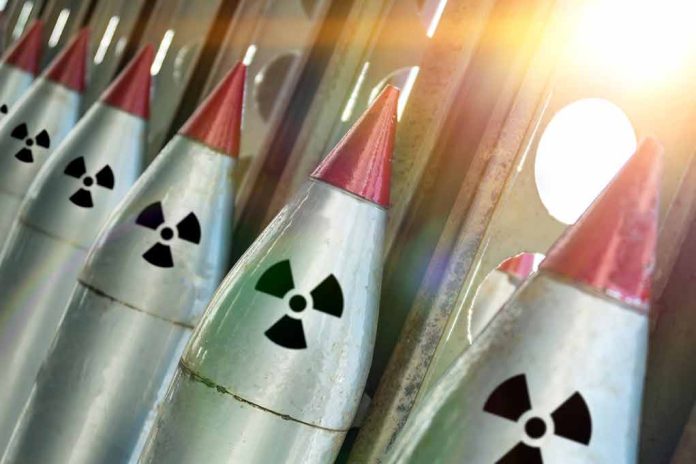
Russia intensifies its assault on Ukraine, launching a second day of massive missile strikes that have heightened global tensions and sparked international condemnation.
At a Glance
- Russia continues massive missile strikes on Ukraine for a second day, targeting critical infrastructure and civilian areas.
- The attacks have led to significant destruction, casualties, and disruptions to daily life in Ukraine.
- International community condemns the assaults and calls for immediate de-escalation.
- Global food security concerns rise as Ukraine’s grain production and exports are affected.
- U.S. perception of direct military conflict risk with Russia over Ukraine may be overstated.
Escalating Crisis in Ukraine
As Russia launches a second day of massive missile strikes on Ukraine, the crisis continues to escalate, causing widespread destruction and raising international alarm. These relentless attacks have targeted critical infrastructure, strategic locations, and civilian areas, leading to a steep rise in the humanitarian toll and severe disruptions to daily life in Ukraine.
The situation has triggered a global outcry, with the international community uniting to condemn the assaults and calling vigorously for de-escalation. The demand for immediate peace talks is growing louder as the world seeks to prevent further loss of life and greater destabilization in the region.
Global Food Security Concerns
The ongoing conflict in Ukraine has had far-reaching consequences, particularly in terms of global food security. Ukraine, often referred to as the “breadbasket of Europe,” has seen its grain production significantly impacted by the war. According to recent data, Ukraine’s grain production dropped by 29% in 2022/2023 due to the conflict.
“The Middle East is perhaps at its most perilous moment in decades as the risk of an all-out regional war pitting Iran and aligned groups against Israel and the U.S. rose sharply.” https://www.crisisgroup.org/crisiswatch
The Russian military’s blockade of Ukraine’s Black Sea ports has further exacerbated the situation, halting exports and causing global food security concerns. The EU has responded by establishing overland transport routes, known as ‘solidarity lanes,’ to aid grain movement. However, Russia’s withdrawal from the Black Sea Grain Initiative in July 2023 has caused another decline in Ukrainian exports and a rise in prices, further straining global food supplies.
U.S.-Russia Relations and Nuclear Concerns
Despite the escalating crisis in Ukraine, Washington’s perception is that the risk of direct military conflict between the U.S. and Russia over Ukraine has been overstated. The U.S. has supplied advanced military equipment to Ukraine without significant Russian retaliation, suggesting a certain level of restraint from both sides.
However, this perceived lack of fear has led to debates within Russia about how to restore America’s concern over nuclear escalation. Some hardliners in Russia have suggested using tactical nuclear weapons or conducting a nuclear bomb demonstration, raising alarm bells in the international community.
“CrisisWatch is our global conflict tracker, an early warning tool designed to help prevent deadly violence. It keeps decision-makers up-to-date with developments in over 70 conflicts and crises every month, identifying trends and alerting them to risks of escalation and opportunities to advance peace.” https://www.crisisgroup.org/crisiswatch
As the crisis in Ukraine continues to unfold, the international community remains on high alert, closely monitoring the situation and working towards a peaceful resolution. The ongoing conflict serves as a stark reminder of the fragility of global peace and the far-reaching consequences of regional disputes in our interconnected world.
Sources:
1.Russian attacks on Ukraine kill five in second day of major strikes, Kyiv says
2. CrisisWatch














